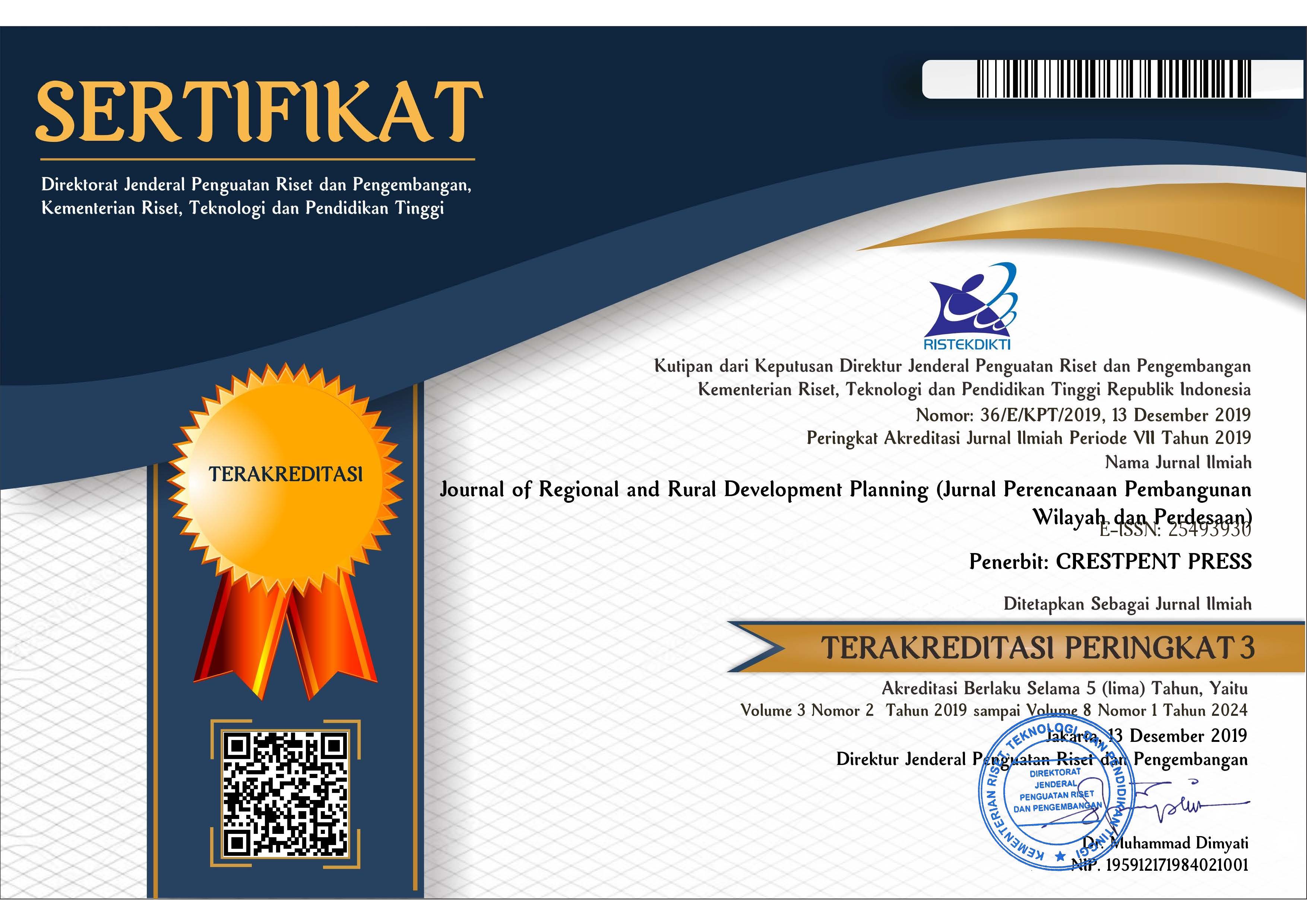Kajian Strategi Penanganan Kawasan Kumuh di Kabupaten Bangka Tengah
Slum Upgrading Strategies in Central Bangka Regency
Abstract
Slum area remains as the main problem faced in urban settlement areas, especially in developing countries. Slum area in Central Bangka Regency reaches a total area of 55.92 hectares, covering 9.1% of Central Bangka Regency area. The local government formulized a strategy named Construction and Development Plan of Housing and Settlement Areas (Rencana Pembangunan dan Pengembangan Perumahan dan Kawasan Permukiman/RP3KP). The objective of this strategy is to analyze whether the strategy for slum upgrading in Central Bangka Regency has been formulated effectively. This is significant since a study of the strategy needs to be conducted before the strategy is legalized and becomes the basic framework for implementation. Quantitative technique is depicted throughout this article by comparing strategies resulted from the RP3KP document with literature driven indicators and with Law Number 1 Year 2011 on Housing and Settlements. Result shows that the plan has been formulated effectively according to three assessment aspects, namely political aspects, administrative aspects, and their suitability to Law Number 1 Year 2011. Despite, for more effective implementation, is it suggested to operationalize the strategy by formulating mechanisms and instruments for effective governance. More detailed implementation strategies shall be regulated, to not only concentrate on physical aspects, but also on non-physical aspects, such as social, economic, and demographical aspects.
References
Babaei, H., Ahmad, N., & Gill, S. S. (2012). Bonding, bridging and linking social capital and empowerment among squatter settlements in Tehran, Iran. World Applied Sciences Journal, 17 (1), 119–126.
Boonyabancha, S., & Kerr, T. (2018). Lessons from CODI on co-production. Environment and Urbanization, 30 (2), 444–460. https://doi.org/10.1177/0956247818791239
Cherunya, P. C., Truffer, B., Samuel, E. M., & Lüthi, C. (2021). The challenges of livelihoods reconstruction in the context of informal settlement upgrading. Environment and Planning A, 53 (1), 168–190. https://doi.org/10.1177/0308518X20926514
Danso-wiredu, E. Y., & Midheme, E. (2017). Slum upgrading in developing countries: lessons from Ghana and Kenya. Ghana Journal of Geography, 9 (1), 88–108.
Das, A. (2017). A city of two tales: Shelter and migrants in surabaya. Environment and Urbanization ASIA, 8 (1), 1–21. https://doi.org/10.1177/0975425316686501
Das, A. (2018). Is innovative also effective? A critique of pro-poor shelter in South-East Asia. International Journal of Housing Policy, 18 (2), 233–265. https://doi.org/10.1080/14616718.2016.1248606
Ebekozien, A., Abdul-Aziz, A. R., & Jaafar, M. (2019). Low-cost housing policies and squatters struggles in Nigeria: the Nigerian perspective on possible solutions. International Journal of Construction Management, 0 (0), 1–11. https://doi.org/10.1080/15623599.2019.1602586
El Menshawy, A., Aly, S. S., & Salman, A. M. (2011). Sustainable upgrading of informal settlements in the developing world, case study: Ezzbet Abd El Meniem Riyadh, Alexandria, Egypt. Procedia Engineering, 21, 168–177. https://doi.org/10.1016/j.proeng.2011.11.2001
Elias, P., Babatola, O., Omojola, A., & Fasona, M. (2017). Prioritising Community Needs Assessment towards Improved Governance of Urban Services : Case Study of Lagos Slum Settlements. Unilag Journal of Humanities (UJH), 5 (1), 25–48.
French, M., Popal, A., Rahimi, H., Popuri, S., & Turkstra, J. (2019). Institutionalizing participatory slum upgrading: a case study of urban co-production from Afghanistan, 2002–2016. Environment and Urbanization, 31 (1), 209–230. https://doi.org/10.1177/0956247818791043
Hasanawi, A., Masturi, H., & Hasanawi, A. (2019). Improvement of Community Governance to Support Slum Upgrading in Indonesia. Jurnal Perencanaan Pembangunan: The Indonesian Journal of Development Planning, 3 (3), 347–358. https://doi.org/10.36574/jpp.v3i3.88
Jones, P. (2017). Formalizing the informal: Understanding the position of informal settlements and slums in sustainable urbanization policies and strategies in Bandung, Indonesia. Sustainability (Switzerland), 9 (8). https://doi.org/10.3390/su9081436
Keuk, J. N., Abdullah, Y. A., & Hamdan, H. (2016). Eradicating Squatters through Resettlement Programme: A Conceptual Paper. MATEC Web of Conferences, 66, 1–9. https://doi.org/10.1051/matecconf/20166600023
Kotaku.pu.go.id. (2017). Tentang Program Kota Tanpa Kumuh (Kotaku). Retrieved from Direktorat Jenderal Cipta Karya Kementerian Pekerjaan Umum dan Perumahan Rakyat website: http://kotaku.pu.go.id/page/6880/tentang-program-kota-tanpa-kumuh-kotaku
Menshawy, A. El, Shafik, S., & Khedr, F. (2016). Affordable Housing as a Method for Informal Settlements Sustainable Upgrading. Procedia - Social and Behavioral Sciences, 223, 126–133. https://doi.org/10.1016/j.sbspro.2016.05.330
Meredith, T., & MacDonald, M. (2017). Community-supported slum-upgrading: Innovations from Kibera, Nairobi, Kenya. Habitat International, 60, 1–9. https://doi.org/10.1016/j.habitatint.2016.12.003
Michiani, M. V., & Asano, J. (2019). Physical upgrading plan for slum riverside settlement in traditional area: A case study in Kuin Utara, Banjarmasin, Indonesia. Frontiers of Architectural Research, 8 (3), 378–395. https://doi.org/10.1016/j.foar.2019.03.005
Mitra, S., Mulligan, J., Schilling, J., Harper, J., Vivekananda, J., & Krause, L. (2017). Developing risk or resilience? Effects of slum upgrading on the social contract and social cohesion in Kibera, Nairobi. Environment and Urbanization, 29 (1), 103–122. https://doi.org/10.1177/0956247816689218
Muchadenyika, D. (2015). Slum upgrading and inclusive municipal governance in Harare , Zimbabwe : New perspectives for the urban poor. Habitat International, 48, 1–10. https://doi.org/10.1016/j.habitatint.2015.03.003
Muchadenyika, D., & Waiswa, J. (2018). Policy, politics and leadership in slum upgrading: A comparative analysis of Harare and Kampala. Cities, 82 (December 2017), 58–67. https://doi.org/10.1016/j.cities.2018.05.005
Patton, C. V, Sawicki, D. S., & Clark, J. J. (2016). Basic Methods of Policy Analysis and Planning Third Edition. In Edition 3.
Purwanto, E., Sugiri, A., & Novian, R. (2017). Determined slum upgrading: A challenge to participatory planning in Nanga Bulik, Central Kalimantan, Indonesia. Sustainability (Switzerland), 9 (7), 1–18. https://doi.org/10.3390/su9071261
Ramdani, B. D., & Haryanto, R. (2013). Preferensi Masyarakat terhadap Penataan Kawasan Permukiman Nelayan Kumuh di Desa Kurau, Kecamatan Koba, Kabupaten Bangka Tengah. Jurnal Teknik PWK, 2 (3), 569–577.
Sullivan, E., & Ward, P. M. (2012). Sustainable housing applications and policies for low-income self-build and housing rehab. Habitat International, 36 (2), 312–323. https://doi.org/10.1016/j.habitatint.2011.10.009
Tengah, D. P. dan K. P. dan P. K. B., & Diponegoro, F. T. U. (2019). Laporan Rencana Penyusunan RP3KP Kabupaten Bangka Tengah Tahun 2019.
Vuksanović-Macura, Z., & Macura, V. (2018). The right to housing: Squatter settlements in interwar belgrade—the defense and demolition of jatagan-mala. Journal of Urban History, 44 (4), 755–774. https://doi.org/10.1177/0096144216632747
Copyright (c) 2021 Journal of Regional and Rural Development Planning (Jurnal Perencanaan Pembangunan Wilayah dan Perdesaan)

This work is licensed under a Creative Commons Attribution-ShareAlike 4.0 International License.




.png)














